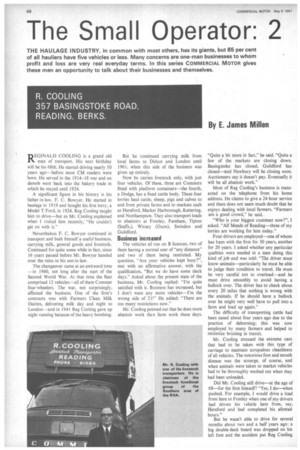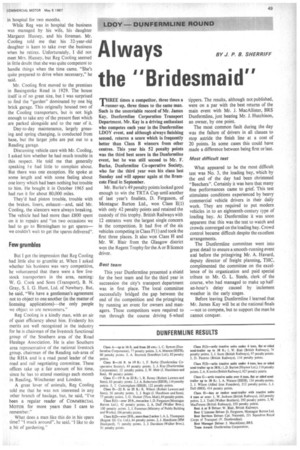The Small Operator: 2
Page 50

Page 51

If you've noticed an error in this article please click here to report it so we can fix it.
THE HAULAGE INDUSTRY, in common with most others, has its giants, but 85 per cent of all hauliers have five vehicles or less. Many concerns are one-man businesses to whom profit and loss are very real everyday terms. In this series COMMERCIAL MOTOR gives these men an opportunity to talk about their businesses and themselves.
By E. James Millen
REGINALD COOLING is a grand old man of transport. His next birthday will be his 68th. He started driving nearly 50 years ago—before most CM readers were born. He served in the 1914-18 war and on demob went back into the bakery trade in which he stayed until 1924.
A significant figure in his history is his father-in-law, F. C. Bowyer. He started in haulage in 1919 and bought his first lorry, a Model T Ford, in 1924. Reg Cooling taught him to drive—but as Mr. Cooling explained when I visited him recently, "He couldn't get on with it."
Nevertheless F. C. Bowyer continued in transport and built himself a useful business, carrying milk, general goods and livestock. Continued for quite some while in fact, since 16 years passed before Mr. Bowyer handed over the reins to his son-in-law.
The changeover came at an awkward time in 1940, not long after the start of the Second World War. At that time the fleet comprised 12 vehicles—all of them Commer four-wheelers. The war, not surprisingly, affected the business. One of the firm's contracts was with Farmers Clean Milk Dairies, delivering milk day and night to London—and in 1941 Reg Cooling gave up night running because of the heavy bombing. But he continued carrying milk from local farms to Didcot and London until 1961, when this side of the business was given up entirely.
Now he carries livestock only, with just four vehicles. Of these, three are Commers fitted with platform containers—the fourth, a Dodge, has a fixed cattle body. These four lorries haul cattle, sheep, pigs and calves to and from private farms and to markets such as Hereford, Market Harborough, Kettering, and Northampton. They also transport loads to abattoirs at Foritley, Fareharn, Tipton (Staffs.), Witney (Oxon), Swindon and Guildford.
Business increased
The vehicles all run on B licences, two of them having a normal user of "any distance" and two of them being restricted. My question, "Are your vehicles kept busy?", met with an affirmative answer, with the qualification, "But we do have some slack days." Asked about the present state of the business, Mr. Cooling replied: "I'm quite satisfied with it. Business has increased, but I don't want any more vehicles—I'm the wrong side of 21!" He added: "There are too many restrictions now."
Mr. Cooling pointed out that he does more abattoir work then farm work these days. "Quite a bit more in fact," he said. "Quite a few of the markets are closing down. Basingstoke has closed, Guildford has closed—and Newbury will be closing soon. Auctioneers say it doesn't pay. Eventually it will be all abattoir work."
Most of Reg Cooling's business is transacted on the telephone from his home address. He claims to give a 24-hour service and there does not seem much doubt that he enjoys dealing with local farmers. "Farmers are a good crowd," he said.
"Who is your biggest custdmer now?", I asked. "Alf Meade of Reading—three of my lorries are working for him today."
Four drivers are employed—one of whom has been with the firm for 30 years, another for 20 years. I asked whether any particular qualities were needed in a man doing this kind of job and was told: "The driver must know animals—particularly he must be able to judge their condition to travel. He must be very careful not to overload—and he must drive smoothly to avoid having a bullock over. The driver has to check about every 20 miles that nothing is wrong with the animals. If he should have a bullock over he might very well have to pull into a farm and load up again."
The difficulty of transporting cattle had been eased about four years ago due to the practice of dehorning; this was now employed by many farmers and helped to minimize bruising in transit.
Mr. Cooling stressed the extreme care that had to be taken with this type of carriage to maintain scrupulous cleanliness of all vehicles. The notorious foot and mouth disease was the scourge, of course, and when animals were taken to market vehicles had to be thoroughly washed out when they had been unloaded.
Did Mr. Cooling still drive—at the age of 68—for the firm himself? "Yes, I do—when pushed. For example, I would drive a load from here to Fontley when one of my drivers had driven his %elide here from, say, Hereford and had completed his allotted hours."
But he wasn't able to drive for several months about two and a half years ago: a big double-deck board was dropped on his left foot and the accident put Reg Cooling
in hospital for two months.
While Reg was in hospital the business was managed by his wife, his daughter Margaret Hussey, and his foreman. Mr. Cooling told me that his 32-year-old daughter is keen to take over the business when he retires. Unfortunately, I did not meet Mrs. Hussey, but Reg Cooling seemed in little doubt that she was quite competent to handle things when the time came. "She's quite prepared to drive when necessary," he said.
Mr. Cooling first moved to the premises in Basingstoke Road in 1929. The house itself is of no great size, but I was surprised to find the "garden" dominated by one big brick garage. This originally housed two of the Cooling transporters, but is not high enough to take any of the present fleet which are parked alongside and to the rear of it.
Day-to-day maintenance, largely greasing and spring changing, is conducted from base, but the larger jobs are put out to a Reading garage.
Discussing vehicle care with Mr. Cooling, I asked him whether he had much trouble in this respect. He told me that generally speaking te had little to complain about. But there was one exception. He spoke at some length and with some feeling about one lorry which had been nothing but trouble to him. He bought it in October 1965 and had run it for about 80,000 miles.
They'd had piston trouble, trouble with the brakes, liners, exhaust—and, said Mr. Cooling, the silencers were always breaking. The vehicle had had more than £.800 spent on it in repairs and "on two occasions we had to go to Birmingham to get spares— we couldn't wait to get the spares delivered".
Few grumbles
But I got the impression that Reg Cooling had little else to grumble at. When I asked whether his business was very competitive, he volunteered that there were a few livestock transporters in the area, naming: W. G. Cook and Sons (Transport), B. N. Gray, S. I. G. Hunt, Ltd. of Newbury. But, he said, "We have a gentleman's agreement not to object to one another (in the matter of licensing applications)—the only people we object to are newcomers."
Reg Cooling is a kindly man, with an air of quiet efficiency about him. Evidently his merits are well recognized in the industry for he is chairman of the livestock functional group of the Southern area of the Road Haulage Association. He is also Southern area representative of the national livestock group, chairman of the Reading sub-area of the RHA and is a road panel leader of the road and rail negotiating committee. These offices take up a fair amount of his time, since he has to attend meetings each month in Reading, Winchester and London.
A great lover of animals, Reg Cooling told me that he was not interested in any other branch of haulage, but, he said, -I've been a regular reader of COMMERCIAL MOTOR for more years than I care to remember."
. What does a man like this do in his spare time? "I muck around", he said, 1 like to do a. bit of gardening."




















































































































